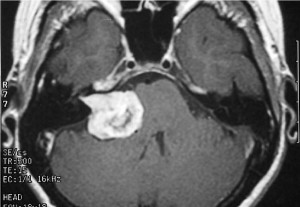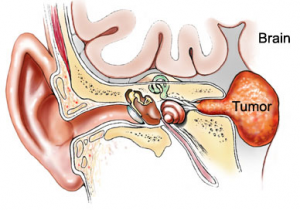Acoustic neuroma treatment can be classified in three different categories, namely periodic monitoring of the condition, radiation treatment and removal through surgical treatment. Before we go into the symptoms and treatment, let us look into what this disease implies.
Acoustic neuroma is a noncancerous (benign) disease which is in the form of a gradually growing tumor that develops on the major nerve going from the inner ear to your brain. As this nerve and its branches can have an influence on your hearing and balance, strain from this disorder ca can lead to hearing loss, ringing in the ear, unsteadiness and loss of balance. This disorder is also known as vestibular schwannoma. Acoustic neuroma is a rare care of hearing loss.
Acoustic neuroma causes:
The reason for acoustic neuroma can be a faulty gene on chromosome 22. Normally, this gene releases a protein that manage the growth of Schwann cells covering the nerves. What makes this gene break down isn’t apparent. Scientists do recognize the faulty gene is inherited in 50 percent of cases of neurofibromatosis 2, an exceptional disorder that characteristically involves tumor growth on the vestibulocochlear nerve on both sides of the head (bilateral neuromas).
Acoustic neuroma Symptoms
Acoustic Neuroma signs and symptoms may include:
• Gradual loss of hearing — although in some cases abrupt — and occurring on only one side or more distinct on one side
• Ringing (tinnitus) in the affected ear
• Dizziness (vertigo)
• Numbness of the face and lethargy
• Shakiness, loss of balance
So, if you have any of these signs, please check with your doctor.
Acoustic neuroma treatment
Treatment options include regular monitoring, radiation and surgical removal.
Monitoring:
In case n case you are suffering from minute acoustic neuroma which is developing slowly and shows very less or no signs of its occurrence, then your doctor may decide to track or monitor acoustic neuroma symptoms through the time.. This is usually suggested to aged individuals or those who do not qualify for acoustic neuroma treatment.
Your health care provider may instruct you to undergo timely hearing examination and imaging; these tests should be conducted every 6 months to one year. This will help in determining whether the acoustic neuroma tumor is maturating and if yes, then how fast. If during the tests it is determined that the tumor is growing or is resulting in increasing audible disability or other such abnormalities, then you may be suggested acoustic neuroma treatment.
Stereotactic radio surgery: or Gamma Knife Acoustic Neuroma
Stereotactic radiosurgeries, for example, gamma-knife radiosurgery, allows doctor to apply radiations exactly to the acoustic neuroma tumor, without the need of incision. Your scalp is first numbed using some kind of anesthesia and then a lightweight headframe is attached on your scalp. Using the advanced imaging scan, your doctor identifies the spot of the tumor and passes the radiation beam.
The chief purpose of this radiation is to cease the development of tumor. This technique is generally utilized in case your tumor is very small and you do not qualify for a surgical treatment. This radiosurgery may also be utilized in case of residual tumors, which is a portion of tumor which cannot be eradicated through brain surgery without damages to brain tissues.
It may take weeks or even years to see evident effects of such radiation treatments. You may have to attend regular checkups for imaging scan which will help the doctor to understand your progress in restoring health. Radiosurgery may include risks such as loss of audibility, facial weakness and problems with balance.
Acoustic neuroma removal Surgery Treatment
.Acoustic neuroma treatment also includes surgical removal. The objective of such surgeries is to remove the tumor, at the same time prevent paralysis of face by protecting facial nerves during surgery. Utmost attention is given on such nerves so that chances of facial paralysis and hearing disability are void. Such surgeries are performed using anesthesia. The tumor may be removed either through ear or by incising your skull. After the surgery you may have to be hospitalized for approximately four to six days; however, complete recovery may take more than six week.
Risks of Acoustic neuroma surgery
In case any cranial structure or surrounding nerves are damaged during the operation, then the surgical acoustic neuroma treatment may lead to complications like symptoms turning worse etc. Some other risks include hearing disability, weakness of face, tinnitus like sounds in the ear, consistent headache, cerebrospinal fluid leakage through the incision or balance issue. Hence, it is essential to gain full understanding about acoustic neuroma and acoustic neuroma treatments, before undergoing any such treatment
Acoustic neuroma Pictures
 Check out how the tumor looks normally and while doing the surgery
Check out how the tumor looks normally and while doing the surgery
